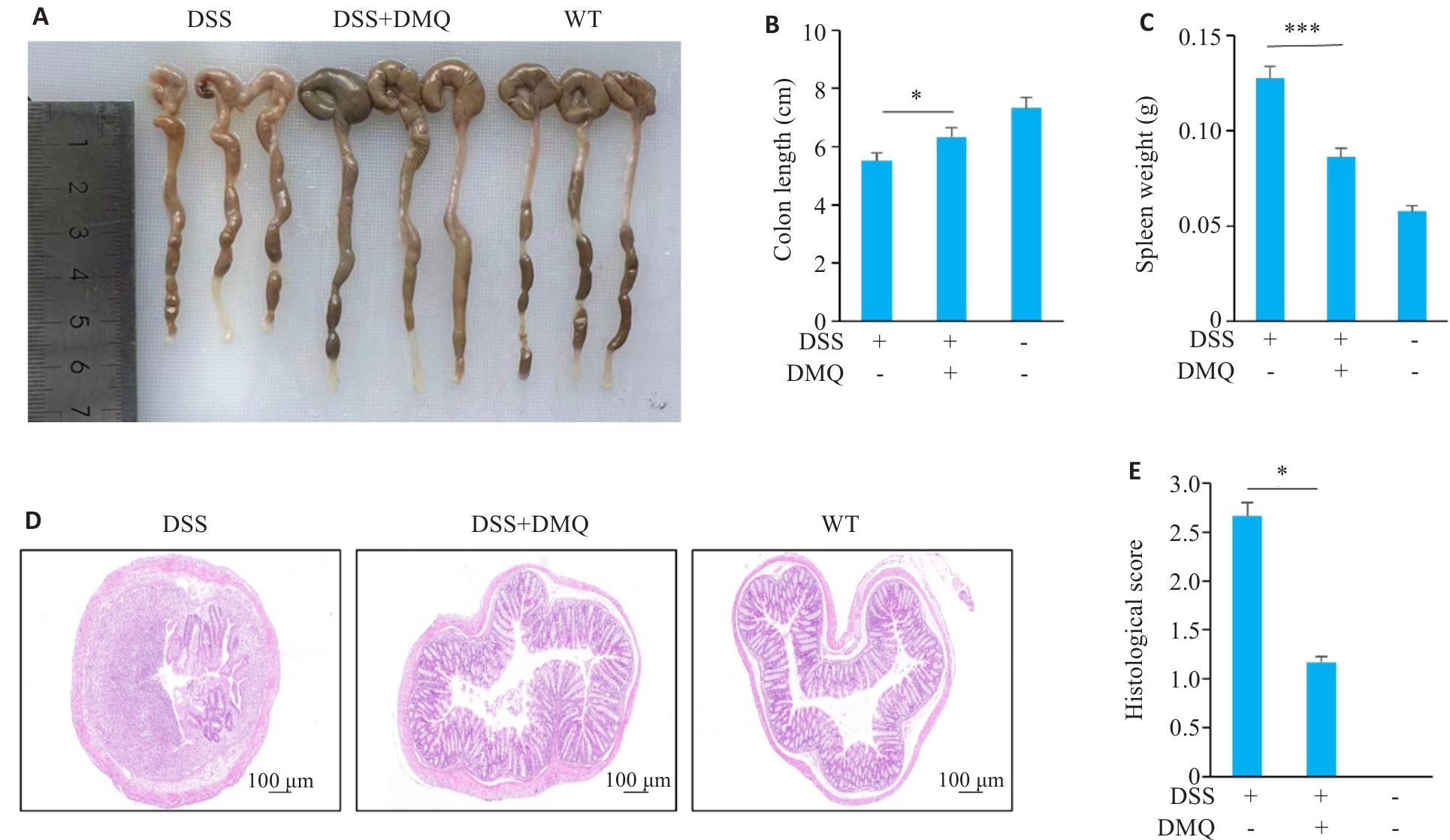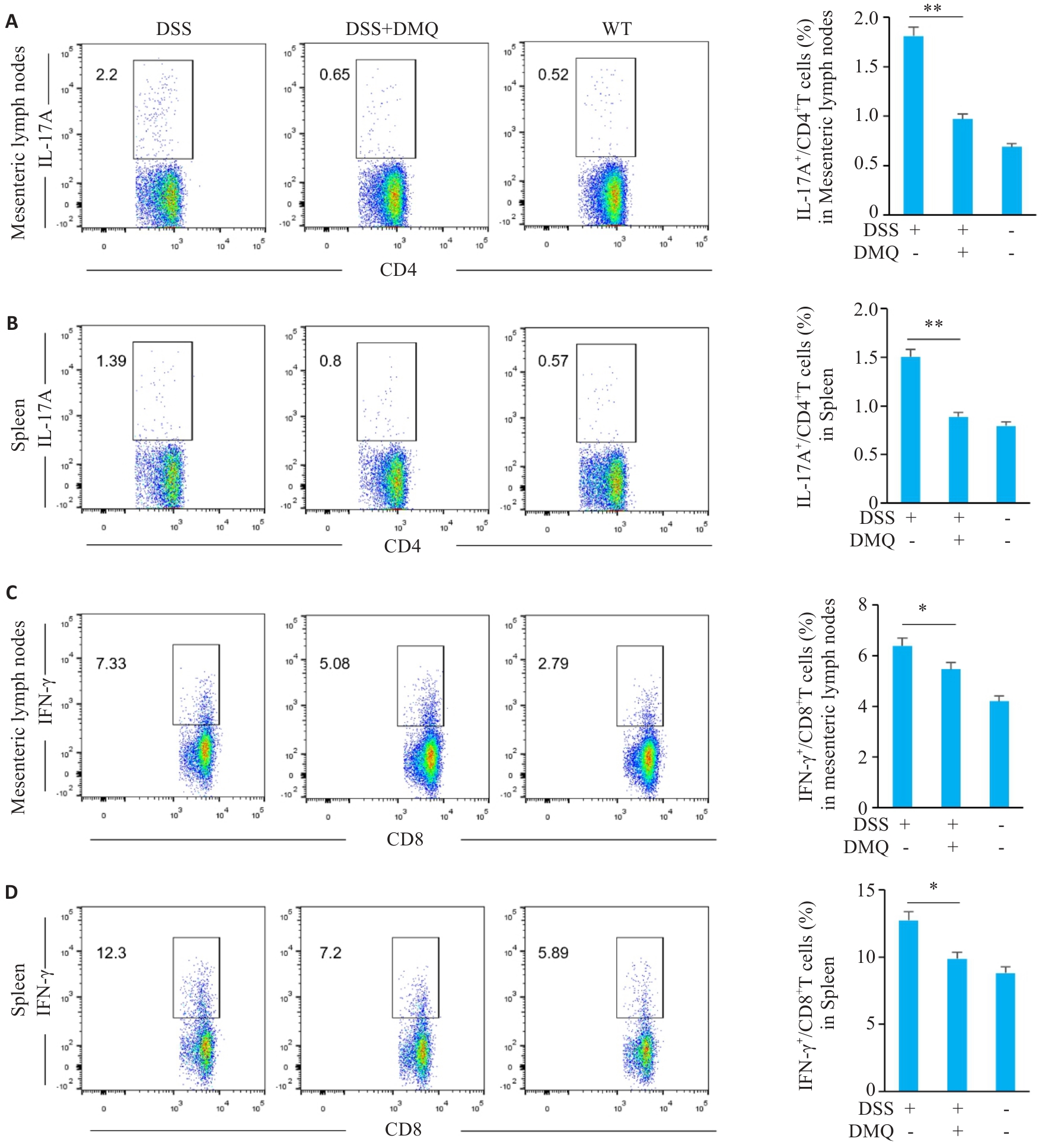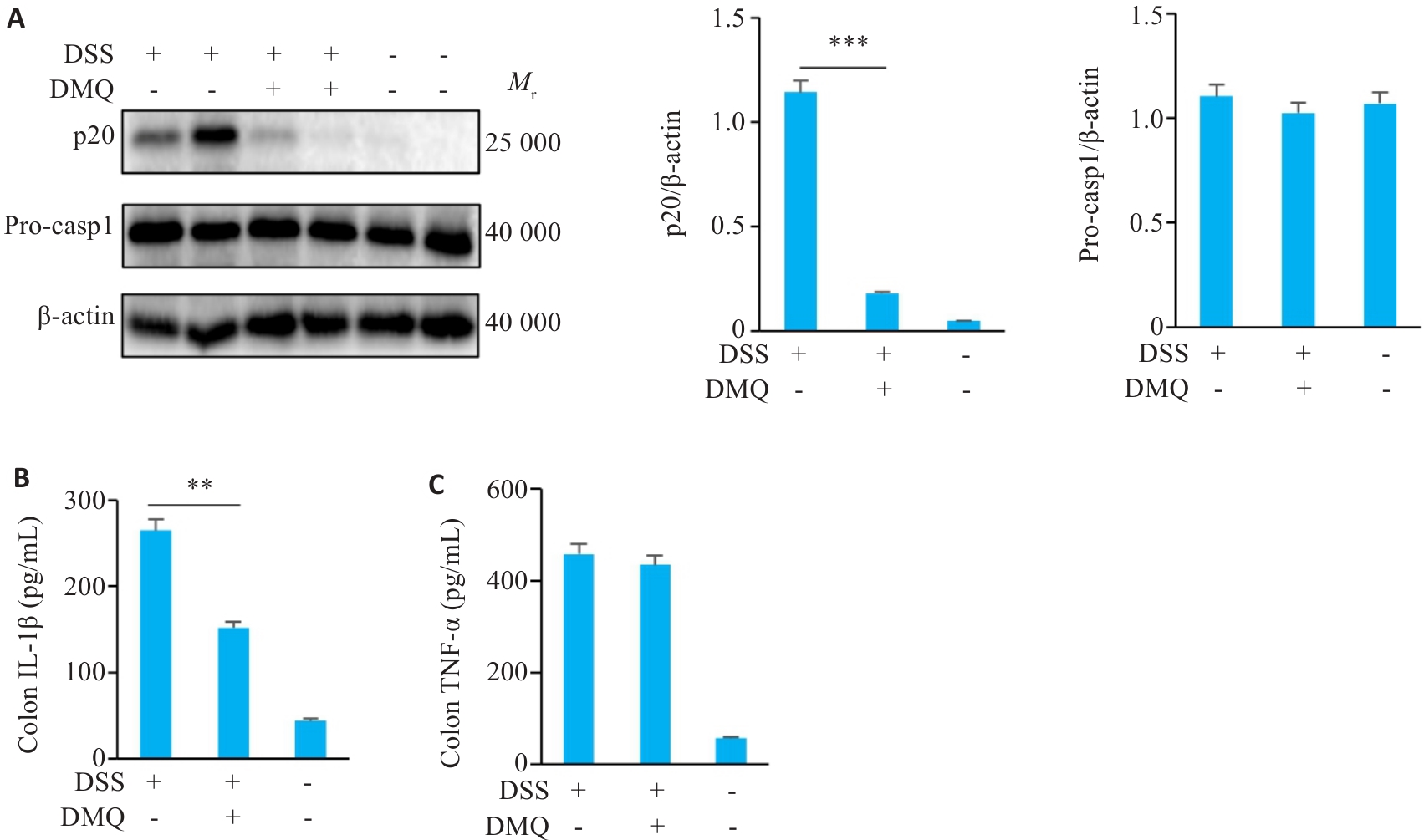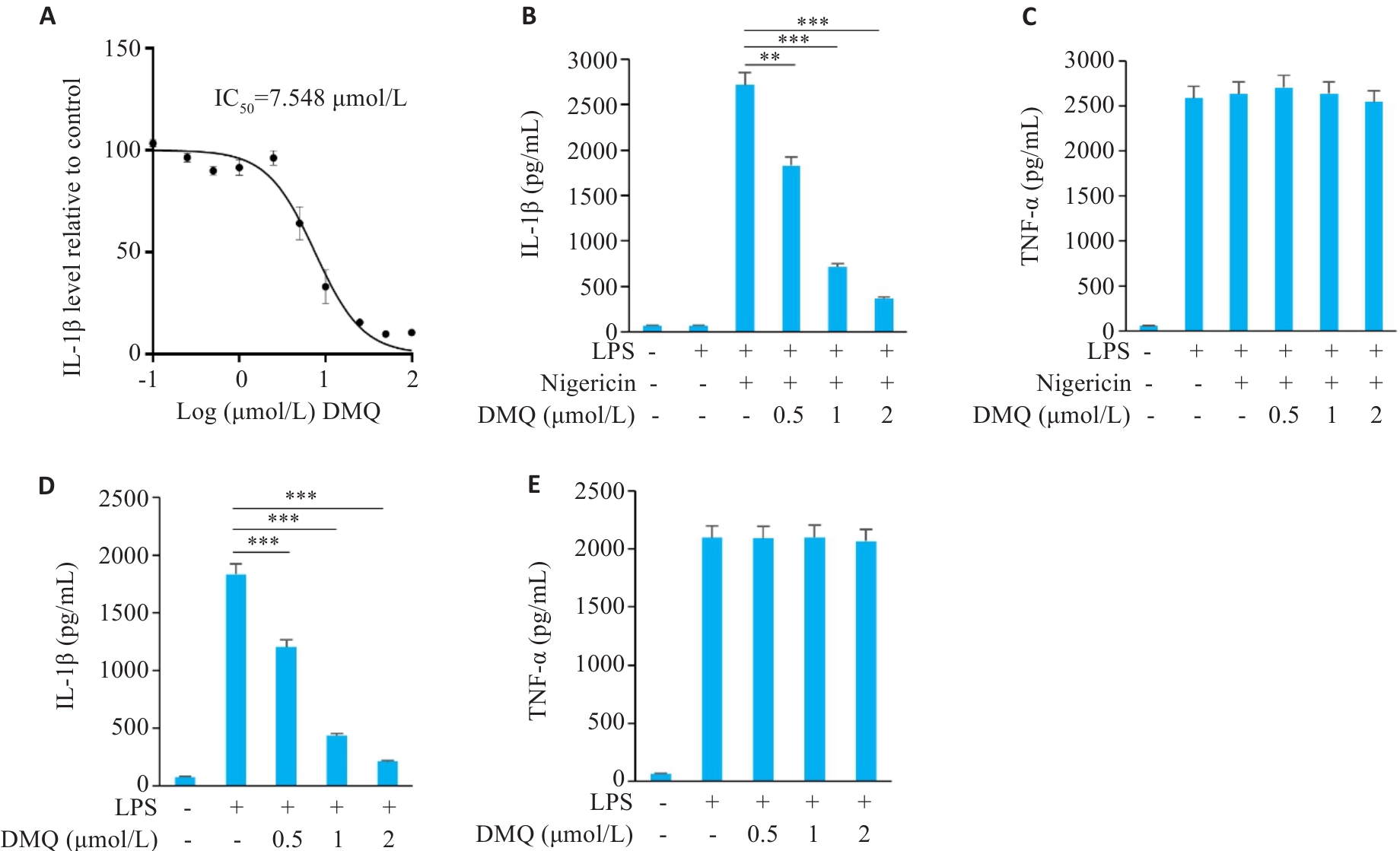Journal of Southern Medical University ›› 2025, Vol. 45 ›› Issue (8): 1654-1662.doi: 10.12122/j.issn.1673-4254.2025.08.10
Chenfei LIU1,2( ), Wei ZHANG1,2, Yao ZENG1,2, Yan LIANG2, Mengting WANG2, Mingfang ZHANG2, Xinyuan LI2, Fengchao WANG1, Yanqing YANG1,2(
), Wei ZHANG1,2, Yao ZENG1,2, Yan LIANG2, Mengting WANG2, Mingfang ZHANG2, Xinyuan LI2, Fengchao WANG1, Yanqing YANG1,2( )
)
Received:2025-03-25
Online:2025-08-20
Published:2025-09-05
Contact:
Yanqing YANG
E-mail:2628819350@qq.com;yyqing@mail.ustc.edu.cn
Supported by:Chenfei LIU, Wei ZHANG, Yao ZENG, Yan LIANG, Mengting WANG, Mingfang ZHANG, Xinyuan LI, Fengchao WANG, Yanqing YANG. 2,6-dimethoxy-1,4-benzoquinone alleviates dextran sulfate sodium-induced ulcerative colitis in mice by suppressing NLRP3 inflammasome activation[J]. Journal of Southern Medical University, 2025, 45(8): 1654-1662.
Add to citation manager EndNote|Ris|BibTeX
URL: https://www.j-smu.com/EN/10.12122/j.issn.1673-4254.2025.08.10

Fig.1 Effect of 2,6-dimethoxy-1,4-benzoquinone (DMQ) on body weight loss (A) and Disease Activity Index (DAI) score (B) in mouse models with dextran sulfate sodium (DSS)-induced ulcerative colitis (UC). **P<0.01, ***P<0.001.

Fig. 2 Effect of DMQ treatment on colon inflammation in mice with DSS-induced UC. A, B: Comparison of colon length among the groups. C: Comparison of spleen weight among the groups. D: HE staining of the colon tissue in each group. E: Histological scores of the colon tissue in each group. n=6. *P<0.05, ***P<0.001.

Fig.3 Effect of DMQ treatment on immune regulation in mice with DSS-induced UC. A: Flow cytometry for detection of the ratio of CD4+IL-17+ cells in the mesenteric lymph nodes of the mice. B: Ratios of CD4+IL-17+ cells in the spleen of the mice. C: Ratios of CD8+ IFN-γ+ cells in the mesenteric lymph nodes of the mice. D: Ratios of CD8+ IFN-γ+ cells in the spleen of the mice. *P<0.05, **P<0.01.

Fig.4 Effect of DMQ treatment on intestinal barrier integrity in mice with DSS-induced UC. A-C: Western blotting for detecting occludin and ZO-1 expressions in the colonic tissues. **P<0.01, ***P<0.001.

Fig.5 Effect of DMQ treatment on colonic NLRP3 inflammasome activation in mice with DSS-induced UC. A: Western blotting of p20 expression in the colonic tissue. B: ELISA for IL-1β in the colonic tissue. C: ELISA for TNF-α in the colonic tissue. **P<0.01, ***P<0.001.

Fig.6 Effect of DMQ treatment on NLRP3 inflammasome activation in the cell models. A: ELISA detection of IL-1β in the culture supernatant of nigericin-stimulated BMDMs. B,C: ELISA detection of IL-1β and TNF-α in the culture supernatant of nigericin-stimulated PBMCs. D,E: ELISA detection of IL-1β and TNF-α in the culture supernatant of LPS-stimulated PBMCs. **P<0.001, ***P<0.001.
| [1] | Conrad K, Roggenbuck D, Laass MW. Diagnosis and classification of ulcerative colitis[J]. Autoimmun Rev, 2014, 13(4/5): 463-6. doi:10.1016/j.autrev.2014.01.028 |
| [2] | Xue JC, Yuan S, Hou XT, et al. Natural products modulate NLRP3 in ulcerative colitis[J]. Front Pharmacol, 2023, 14: 1265825. doi:10.3389/fphar.2023.1265825 |
| [3] | Adams SM, Close ED, Shreenath AP. Ulcerative colitis: rapid evidence review[J]. Am Fam Physician, 2022, 105(4): 406-11. |
| [4] | 林轩永. 溃疡性结肠炎治疗现状及进展[J]. 临床医药文献电子杂志, 2020, 7(12): 191-3. |
| [5] | Le Berre C, Honap S, Peyrin-Biroulet L. Ulcerative colitis[J]. Lancet, 2023, 402(10401): 571-84. doi:10.1016/s0140-6736(23)00966-2 |
| [6] | Zhao N, Liu CG, Li N, et al. Role of interleukin-22 in ulcerative colitis[J]. Biomed Pharmacother, 2023, 159: 114273. doi:10.1016/j.biopha.2023.114273 |
| [7] | Yuan Z, Yu DK, Gou TT, et al. Research progress of NLRP3 inflammasome and its inhibitors with aging diseases[J]. Eur J Pharmacol, 2023, 957: 175931. doi:10.1016/j.ejphar.2023.175931 |
| [8] | Li JY, Wang YY, Shao T, et al. The zebrafish NLRP3 inflammasome has functional roles in ASC-dependent interleukin-1β maturation and gasdermin E-mediated pyroptosis[J]. J Biol Chem, 2020, 295(4): 1120-41. doi:10.1016/s0021-9258(17)49920-0 |
| [9] | Tastan B, Arioz BI, Genc S. Targeting NLRP3 inflammasome with Nrf2 inducers in central nervous system disorders[J]. Front Immunol, 2022, 13: 865772. doi:10.3389/fimmu.2022.865772 |
| [10] | Lv SY, Wang HG, Li XT. The role of the interplay between autophagy and NLRP3 inflammasome in metabolic disorders[J]. Front Cell Dev Biol, 2021, 9: 634118. doi:10.3389/fcell.2021.634118 |
| [11] | Guan YL, Gu YY, Li H, et al. NLRP3 inflammasome activation mechanism and its role in autoimmune liver disease[J]. Acta Biochim Biophys Sin (Shanghai), 2022, 54(11): 1577-86. doi:10.3724/abbs.2022137 |
| [12] | Zhang FR, Zhao W, Zhou J, et al. Heat shock transcription factor 2 reduces the secretion of IL-1β by inhibiting NLRP3 inflammasome activation in ulcerative colitis[J]. Gene, 2021, 768: 145299. doi:10.1016/j.gene.2020.145299 |
| [13] | Sun LH, Ouyang J, Zeng F, et al. An AIEgen-based oral-administration nanosystem for detection and therapy of ulcerative colitis via 3D-MSOT/NIR-II fluorescent imaging and inhibiting NLRP3 inflammasome[J]. Biomaterials, 2022, 283: 121468. doi:10.1016/j.biomaterials.2022.121468 |
| [14] | Yang YQ, Liu DD, Cao HR, et al. Rosthornin B alleviates inflammatory diseases via directly targeting NLRP3[J]. FASEB J, 2024, 38(24): e70248. doi:10.1096/fj.202401198r |
| [15] | 曹海若, 张 玮, 李明远, 等. 川藏香茶菜丙素抑制NLRP3炎症小体活化并缓解小鼠脓毒性休克[J]. 南方医科大学学报, 2023, 43(9): 1476-84. doi:10.12122/j.issn.1673-4254.2023.09.04 |
| [16] | Liu Y, Li BG, Su YH, et al. Potential activity of traditional Chinese medicine against ulcerative colitis: a review[J]. J Ethnopharmacol, 2022, 289: 115084. doi:10.1016/j.jep.2022.115084 |
| [17] | Cao SY, Ye SJ, Wang WW, et al. Progress in active compounds effective on ulcerative colitis from Chinese medicines[J]. Chin J Nat Med, 2019, 17(2): 81-102. doi:10.1016/s1875-5364(19)30012-3 |
| [18] | Otto C, Hahlbrock T, Eich K, et al. Antiproliferative and antimetabolic effects behind the anticancer property of fermented wheat germ extract[J]. BMC Complement Altern Med, 2016, 16: 160. doi:10.1186/s12906-016-1138-5 |
| [19] | Boros LG, Nichelatti M, Shoenfeld Y. Fermented wheat germ extract (Avemar) in the treatment of cancer and autoimmune diseases[J]. Ann N Y Acad Sci, 2005, 1051: 529-42. doi:10.1196/annals.1361.097 |
| [20] | 张 玮, 邓蒙蒙, 曾 尧, 等. 2, 6-二甲氧基-1, 4-苯醌通过抑制NLRP3炎症小体活化缓解小鼠的感染性休克[J]. 南方医科大学学报, 2024, 44(6): 1024-32. doi:10.12122/j.issn.1673-4254.2024.06.02 |
| [21] | Ran ZH, Wu KC, Matsuoka K, et al. Asian Organization for Crohn's and Colitis and Asia Pacific Association of Gastroenterology practice recommendations for medical management and monitoring of inflammatory bowel disease in Asia[J]. J Gastroenterol Hepatol, 2021, 36(3): 637-45. doi:10.1111/jgh.15185 |
| [22] | Wang M, Fu RJ, Xu DQ, et al. Traditional Chinese Medicine: a promising strategy to regulate the imbalance of bacterial flora, impaired intestinal barrier and immune function attributed to ulcerative colitis through intestinal microecology[J]. J Ethno-pharmacol, 2024, 318(Pt A): 116879. doi:10.1016/j.jep.2023.116879 |
| [23] | Cai JP, Liu JX, Fan P, et al. Dioscin prevents DSS-induced colitis in mice with enhancing intestinal barrier function and reducing colon inflammation[J]. Int Immunopharmacol, 2021, 99: 108015. doi:10.1016/j.intimp.2021.108015 |
| [24] | Wu ZC, Zhao ZL, Deng JP, et al. Sanhuang Shu’ai decoction alleviates DSS-induced ulcerative colitis via regulation of gut microbiota, inflammatory mediators and cytokines[J]. Biomed Pharmacother, 2020, 125: 109934. doi:10.1016/j.biopha.2020.109934 |
| [25] | Wang Z, Wu X, Wang CL, et al. Tryptanthrin protects mice against dextran sulfate sodium-induced colitis through inhibition of TNF-α/NF-κB and IL-6/STAT3 pathways[J]. Molecules, 2018, 23(5): 1062. doi:10.3390/molecules23051062 |
| [26] | Zhang W, Zou ML, Fu J, et al. Autophagy: a potential target for natural products in the treatment of ulcerative colitis[J]. Biomed Pharmacother, 2024, 176: 116891. doi:10.1016/j.biopha.2024.116891 |
| [27] | Dai NN, Yang XT, Pan PL, et al. Bacillus paralicheniformis, an acetate-producing probiotic, alleviates ulcerative colitis via protecting the intestinal barrier and regulating the NLRP3 inflammasome[J]. Microbiol Res, 2024, 287: 127856. doi:10.1016/j.micres.2024.127856 |
| [28] | Zhen Y, Zhang H. NLRP3 inflammasome and inflammatory bowel disease[J]. Front Immunol, 2019, 10: 276. doi:10.3389/fimmu.2019.00276 |
| [29] | Yuan YY, Wang F, Liu XX, et al. The role of AMPK signaling in ulcerative colitis[J]. Drug Des Devel Ther, 2023, 17: 3855-75. doi:10.2147/dddt.s442154 |
| [30] | Li JH, Xu J, Huang C, et al. Houttuynia cordata-derived exosome-like nanoparticles mitigate colitis in mice via inhibition of the NLRP3 signaling pathway and modulation of the gut microbiota[J]. Int J Nanomedicine, 2024, 19: 13991-4018. doi:10.2147/ijn.s493434 |
| [31] | Sun J, Wang S, Zhao ZT, et al. Oxymatrine attenuates ulcerative colitis through inhibiting pyroptosis mediated by the NLRP3 inflammasome[J]. Molecules, 2024, 29(12): 2897. doi:10.3390/molecules29122897 |
| [32] | Ma ZR, Li ZL, Zhang N, et al. Inhibition of GSDMD-mediated pyroptosis triggered by Trichinella spiralis intervention contributes to the alleviation of DSS-induced ulcerative colitis in mice[J]. Parasit Vectors, 2023, 16(1): 280. doi:10.1186/s13071-023-05857-3 |
| [33] | Li Q, Feng H, Wang HB, et al. Licochalcone B specifically inhibits the NLRP3 inflammasome by disrupting NEK7-NLRP3 interaction[J]. EMBO Rep, 2022, 23(2): e53499. doi:10.15252/embr.202153499 |
| [34] | Lin YQ, Luo TY, Weng AL, et al. Gallic acid alleviates gouty arthritis by inhibiting NLRP3 inflammasome activation and pyroptosis through enhancing Nrf2 signaling[J]. Front Immunol, 2020, 11: 580593. doi:10.3389/fimmu.2020.580593 |
| [35] | Gaidt MM, Ebert TS, Chauhan D, et al. Human monocytes engage an alternative inflammasome pathway[J]. Immunity, 2016, 44(4): 833-46. doi:10.1016/j.immuni.2016.01.012 |
| [36] | Liu C, Gong QM, Liu WN, et al. Berberine-loaded PLGA nanoparticles alleviate ulcerative colitis by targeting IL-6/IL-6R axis[J]. J Transl Med, 2024, 22(1): 963. doi:10.1186/s12967-024-05682-x |
| [37] | Thapa B, Pak S, Chung D, et al. Cell-penetrating TLR inhibitor peptide alleviates ulcerative colitis by the functional modulation of macrophages[J]. Front Immunol, 2023, 14: 1165667. doi:10.3389/fimmu.2023.1165667 |
| [1] | Zhengwang ZHU, Linlin WANG, Jinghan ZHAO, Ruixue MA, Yuchun YU, Qingchun CAI, Bing WANG, Pingsheng ZHU, Mingsan MIAO. Tuihuang Mixture improves α‑naphthylisothiocyanate-induced cholestasis in rats by inhibiting NLRP3 inflammasomes via regulating farnesoid X receptor [J]. Journal of Southern Medical University, 2025, 45(4): 718-724. |
| [2] | Lin SHEN, Cuihao SONG, Congmin WANG, Xi GAO, Junhong AN, Chengxin LI, Bin LIANG, Xia LI. Risk factors for malnutrition in ulcerative colitis complicated with pyoderma gangrenosum and construction of a lasso regression-based prediction model [J]. Journal of Southern Medical University, 2025, 45(3): 514-521. |
| [3] | Mingyuan LI, Wei ZHANG, Mengqing HUA. Bardoxolone methyl alleviates acute liver injury in mice by inhibiting NLRP3 inflammasome activation [J]. Journal of Southern Medical University, 2024, 44(9): 1662-1669. |
| [4] | Na ZHAO, Mengdi SHEN, Rui ZHAO, Di AO, Zetan LUO, Yinliang ZHANG, Zhidong XU, Fangtian FAN, Hailun ZHENG. column:Sanguinarine alleviates ulcerative colitis in mice by regulating the Nrf2/NF-κB pathway [J]. Journal of Southern Medical University, 2024, 44(8): 1467-1475. |
| [5] | Guanzheng YU, Weiqiang CHENG, Xing TU, Man ZHANG, Hong LI, Juan NIE. Therapeutic mechanism of Cynanchum wilfordii for ulcerative colitis: an analysis using UPLC-QE-MS, network pharmacology and metabolomics [J]. Journal of Southern Medical University, 2024, 44(8): 1485-1496. |
| [6] | Wei ZHANG, Mengmeng DENG, Yao ZENG, Chenfei LIU, Feifei SHANG, Wenhao XU, Haoyi JIANG, Fengchao WANG, Yanqing YANG. 2,6-dimethoxy-1,4-benzoquinone alleviates septic shock in mice by inhibiting NLRP3 inflammasome activation [J]. Journal of Southern Medical University, 2024, 44(6): 1024-1032. |
| [7] | FANG Shangping, SUN Renke, SU Hui, ZHAI Kecheng, XIANG Yu, GAO Yangmengna, GUO Wenjun. Chlorogenic acid alleviates acute kidney injury in septic mice by inhibiting NLRP3 inflammasomes and the caspase-1 canonical pyroptosis pathway [J]. Journal of Southern Medical University, 2024, 44(2): 317-323. |
| [8] | LING Xuguang, XU Wenwen, PANG Guanlai, HONG Xuxing, LIU Fengqin, LI Yang. Tea polyphenols ameliorates acute lung injury in septic mice by inhibiting NLRP3 inflammasomes [J]. Journal of Southern Medical University, 2024, 44(2): 381-386. |
| [9] | Jianguo QIU, Yitong QIU, Guorong LI, Linsheng ZHANG, Xue ZHENG, Yongjiang YAO, Xidan WANG, Haiyang HUANG, Fengmin ZHANG, Jiyan SU, Xuebao ZHENG, Xiaoqi HUANG. Huangqin Decoction alleviates ulcerative colitis in mice by reducing endoplasmic reticulum stress [J]. Journal of Southern Medical University, 2024, 44(11): 2172-2183. |
| [10] | CAO Hairuo, ZHANG Wei, LI Mingyuan, YANG Yanqing, LI Yuyun. Isodopharicin C inhibits NLRP3 inflammasome activation and alleviates septic shock in mice [J]. Journal of Southern Medical University, 2023, 43(9): 1476-1484. |
| [11] | SONG Zejun, DONG Haibin, MA Na, REN Yutang, JIANG Bo. Value of Improved Mayo Endoscopic Score for evaluating treatment efficacy for active ulcerative colitis [J]. Journal of Southern Medical University, 2023, 43(7): 1204-1213. |
| [12] | SONG Zejun, ZHANG Mingjun, REN Yutang, JIANG Bo. Improved Mayo Endoscopic Score has a higher value for evaluating clinical severity of ulcerative colitis [J]. Journal of Southern Medical University, 2022, 42(7): 997-1005. |
| [13] | KUERBANNAIMU Kaheman, ZHAO Jianfeng, MUKAIDAISI Aihemaiti, WANG Hanming, ZHU Jiwei, PAN Wentao, KASIMUJIANG Aximujiang. E.faecium QH06 alleviates TNBS-induced colonic mucosal injury in rats [J]. Journal of Southern Medical University, 2022, 42(7): 976-987. |
| [14] | LU Li, LIU Didi, YANG Yanqing, WANG Fengchao. WP1130 relieves septic shock in mice by inhibiting NLRP3 inflammasome activation [J]. Journal of Southern Medical University, 2022, 42(12): 1747-1754. |
| [15] | . Inhibition of mitochondrial reactive oxygen species reduces high glucose-induced pyroptosis and ferroptosis in H9C2 cardiac myocytes [J]. Journal of Southern Medical University, 2021, 41(7): 980-987. |
| Viewed | ||||||
|
Full text |
|
|||||
|
Abstract |
|
|||||